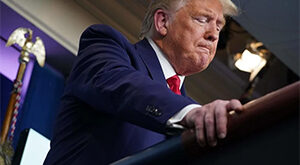WASHINGTON — White House trade adviser Peter Navarro said Sunday that President Donald Trump is not planning to exempt any countries from his increase in tariffs on imported steel and aluminum coming from foreign shores.
Navarro told MEDIA that final details on Trump’s anticipated 25 percent tax on steel imports and a 10 percent tariff on aluminum should be completed by later in the week or early next week at the latest.
Trump’s new tariffs for the key metals have drawn wide condemnation from business-oriented Republican lawmakers in the U.S., as well as key allied trading partners — Canada and the European Union. But Navarro said the tariffs are needed to “protect our national security and economic security, broadly defined.”
He dismissed concerns from Defense Department officials who voiced support for targeted tariff increases aimed at specific countries but not increases on the imported metals from throughout the world.
Navarro said Trump “listens to all sides and makes the tough decisions. I think it’s the right decision.” He called it “a slippery slope” to target only some countries with increased tariffs while exempting others. He said there would be a mechanism to exclude some businesses, on a case-by-case basis, from having to pay higher prices for the imported metals.
Canada, the largest U.S. trading partner, could be the hardest hit, since last year it shipped $7.2 billion worth of aluminum to the U.S. and steel valued at $4.3 billion. The tariffs would also hit other U.S. allies — Britain, Germany, South Korea, Turkey and Japan. But China, the world’s biggest steel producer, only sends 2 percent of its supply to the U.S. and would be less affected.
Navarro said the message to the world on U.S. trade practices is simple: “We’re not going to take it anymore. We don’t get good results,” Navarro said, adding that U.S. trade overseas is “not fair and reciprocal.”
In another news talk show appearance, Commerce Secretary Wilbur Ross told News that Trump has talked with “a number of the world leaders” about his trade tariff plans.
British Prime Minister Theresa May’s office said that in a Sunday phone call with Trump she had “raised our deep concern at the president’s forthcoming announcement on steel and aluminium tariffs, noting that multilateral action was the only way to resolve the problem of global overcapacity in all parties’ interests.”
U.S. Commerce secretary Ross said the total value of the impending U.S. tariffs amounts to about $9 billion a year, a fraction of 1 percent of the annual $18.6 trillion U.S. economy, the world’s largest.
“So, the notion that it would destroy a lot of jobs, raise prices, disrupt things, is wrong,” Ross said.
Ross dismissed European Union threats of imposing retaliatory tariffs on such prominent American products as Harley Davidson motorcycles, bourbon and Levi’s jeans as unimportant and a “rounding error.”
In response on Saturday, Trump threatened European automakers with a tax on imports if the European Union retaliates against the U.S.
Ross called the possible European levies a “pretty trivial amount of retaliatory tariffs, adding up to some $3 billion of goods. In our size economy, that’s a tiny, tiny fraction of 1 percent. So, while it might affect an individual producer for a little while, overall, it’s not going to be much more than a rounding error.”
Trump weighed in Saturday on his rationale for the tariff hikes with a pair of Twitter comments.
“The United States has an $800 Billion Dollar Yearly Trade Deficit because of our ‘very stupid’ trade deals and policies,” he said. “Our jobs and wealth are being given to other countries that have taken advantage of us for years. They laugh at what fools our leaders have been. No more!
In 2017, the U.S. imported $151 billion more in goods from Europe than it exported to EU countries.

 South Asian Gazette Worldwide News Work
South Asian Gazette Worldwide News Work



